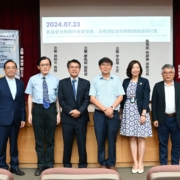【Media Report】The Center for Health and Welfare Policy at Taipei Medical University Hosts a Seminar on “The Future Development of Food Safety Policy: Challenges and Opportunities in Regulation and Supervision,” Bringing Together Multiple Experts to Discuss New Directions in Food Safety Policy.
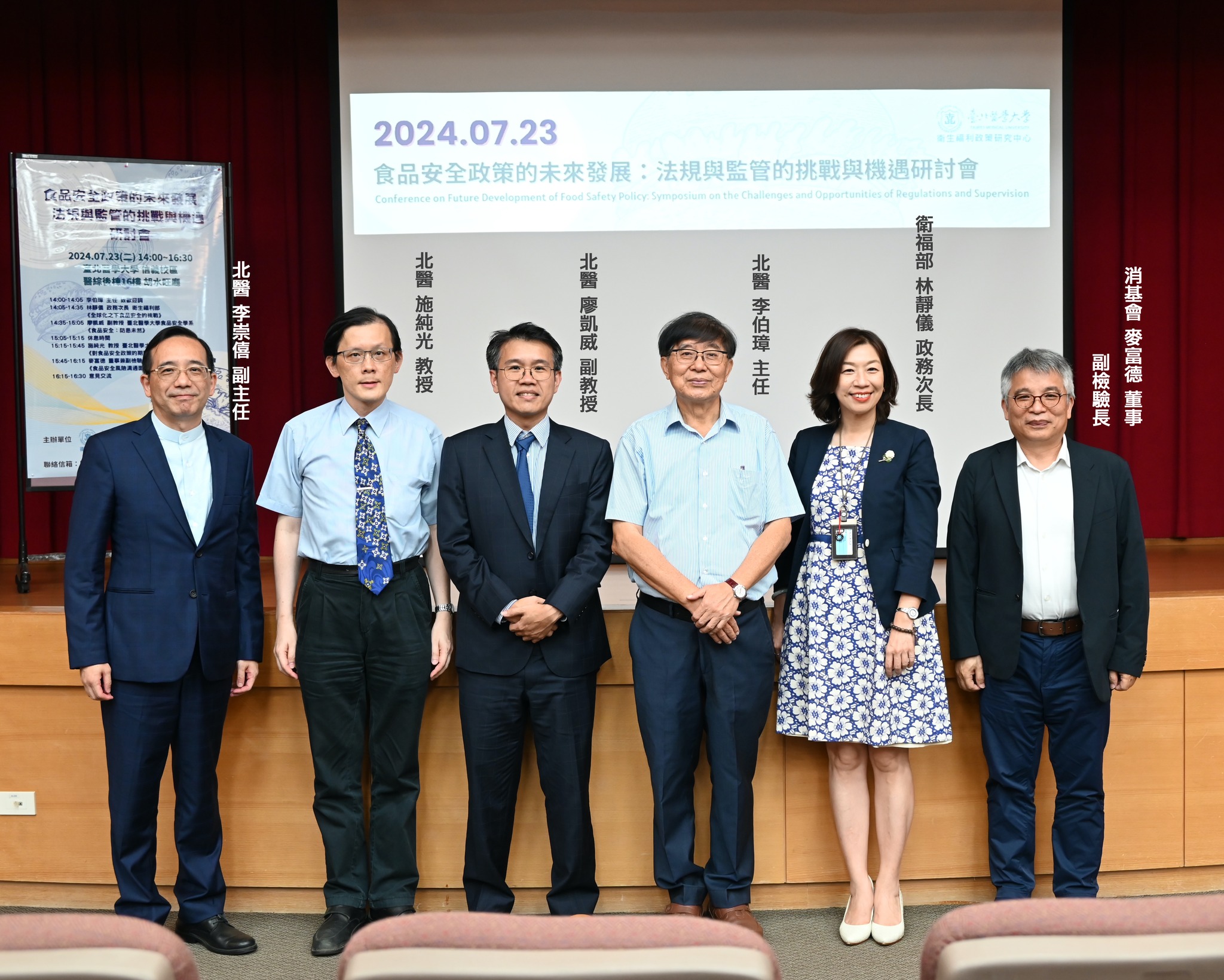
On July 23, 2024, the Center for Health and Welfare Policy at Taipei Medical University hosted an academic seminar titled “The Future Development of Food Safety Policy: Challenges and Opportunities in Regulation and Supervision.” The conference aimed to delve into the diverse challenges currently facing food safety policies and strive to build a more proactive and comprehensive policy framework to address emerging food safety issues. The seminar covered various fields, including food safety and public health, with several scholars and experts invited, such as Deputy Minister of Health and Welfare Lin Jingyi, Associate Professor of the Department of Food Safety at Taipei Medical University Liao Kaiwei, Professor of the Department of Health and Nutrition at Taipei Medical University Shi Chunguang, and Board Director and Deputy Chief Inspector of the Consumers’ Foundation, R.O.C., Mai Fude.
Director Lee Bochang Urges Multi-party Cooperation to Restore Confidence in Food Safety and Create a Healthy Eating Environment

Lee Bochang, Director of the Center for Health and Welfare Policy at Taipei Medical University, delivered a welcome speech. He urged the government to strengthen food safety supervision and improve relevant regulations. He also emphasized the importance of business ethics and integrity in the food industry. Lee stated that only by maintaining hope, mutual trust, and taking proactive actions can society as a whole construct a reliable and trustworthy food safety system.
Deputy Minister Lin Jingyi: Multiple Challenges to Food Safety in the Era of Globalization and Interdepartmental Cooperation
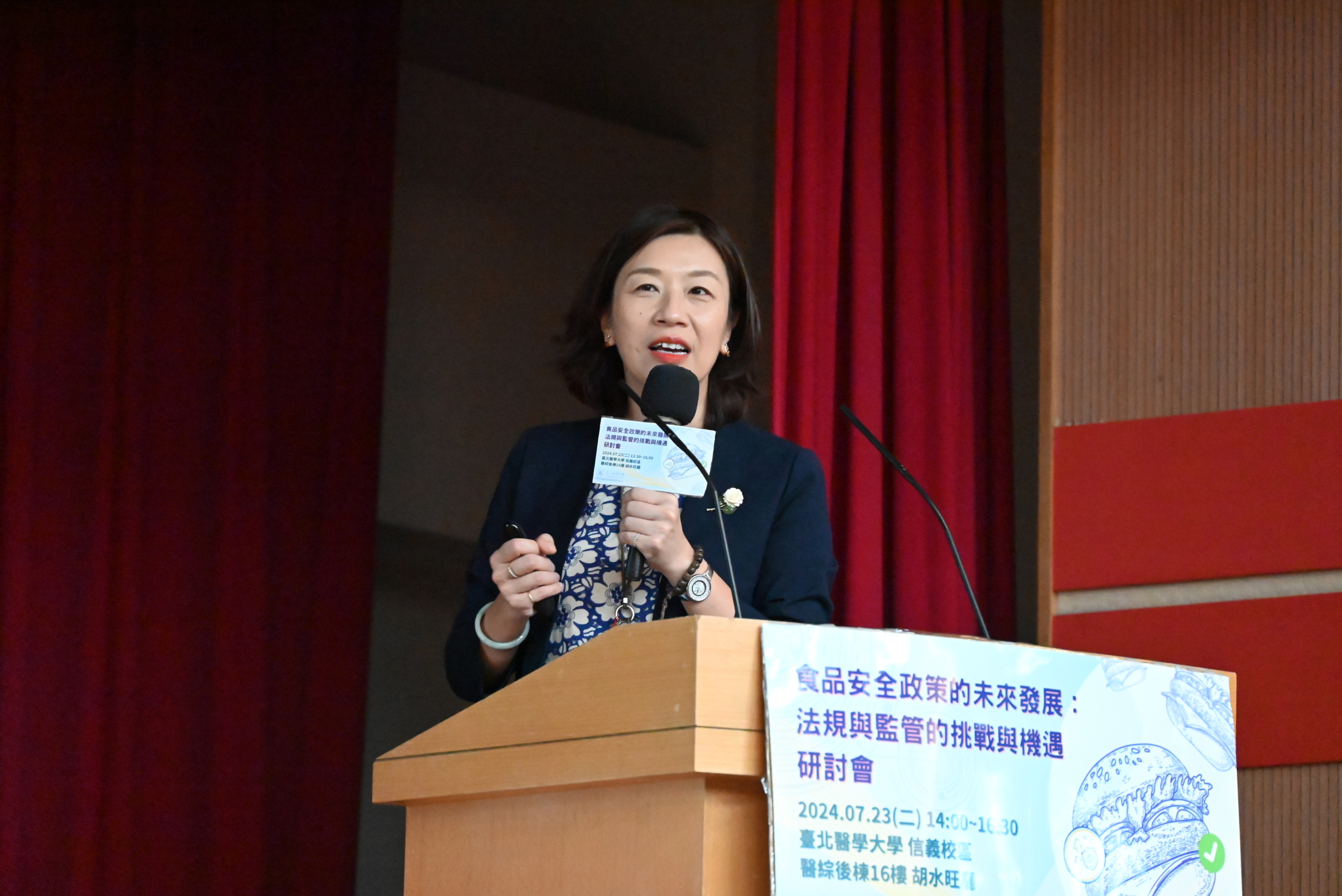
Deputy Minister of Health and Welfare Lin Jingyi discussed the multiple challenges facing food safety in the current era of globalization and proposed corresponding strategies and future outlooks. Deputy Minister Lin stressed that food safety management is a comprehensive process from farm to table. The Ministry of Health and Welfare ensures the effective implementation of food safety policies and systems through interdepartmental coordination mechanisms, integrating platforms such as the Executive Yuan’s Food Safety Conference and the Environmental Protection and Food Safety Coordination Conference.
Challenges Brought by Globalization
- Risks in Food Trade: International trade disputes and natural disasters may impact the stability of the food supply chain, and unethical practices can lead to food adulteration and counterfeiting.
- Climate Change Impact: Extreme weather events like floods and droughts threaten food infrastructure and safety. The greenhouse effect accelerates food spoilage, increasing the risk of foodborne illnesses.
- Human Resource Issues: The high turnover and lack of training for foreign workers in the catering and food processing industries may lead to overlooked food safety and hygiene steps, affecting food safety.
- Emerging Technological Challenges: New technologies such as edible insects, cultured meat, 3D-printed food, and emerging genomics and breeding technologies pose higher demands for food safety regulation.
- New Business Models: The rise of food delivery platforms, cloud kitchens, and smart vending machines requires adjustments in regulatory standards and management measures to ensure food safety during delivery.
Response Strategies and Future Prospects
To address these challenges, the Ministry of Health and Welfare has proposed a series of response strategies. First, the ministry will enhance the intelligent detection and prevention capabilities of food safety risks through big data analysis and artificial intelligence technology. Second, they will revise relevant regulatory standards to ensure they are up-to-date and aligned with international standards. Meanwhile, they will strengthen food safety education and public engagement to increase consumer awareness of food safety.
The Ministry will also promote food safety through multiple channels, such as using Line, Instagram, and Facebook, to enhance communication with the public and ensure the accurate transmission of food safety information. For the challenges posed by emerging technologies and business models, the Ministry will continue researching and formulating corresponding standards and policies to perfect the food safety management system.
In conclusion, Deputy Minister Lin called for government, industry, academia, and consumers to work together to build a sound food safety management system, ensuring public health and food safety in the era of globalization.
Associate Professor Liao Kaiwei Emphasizes the Importance of Comprehensive Collaboration in Food Safety Risk Management
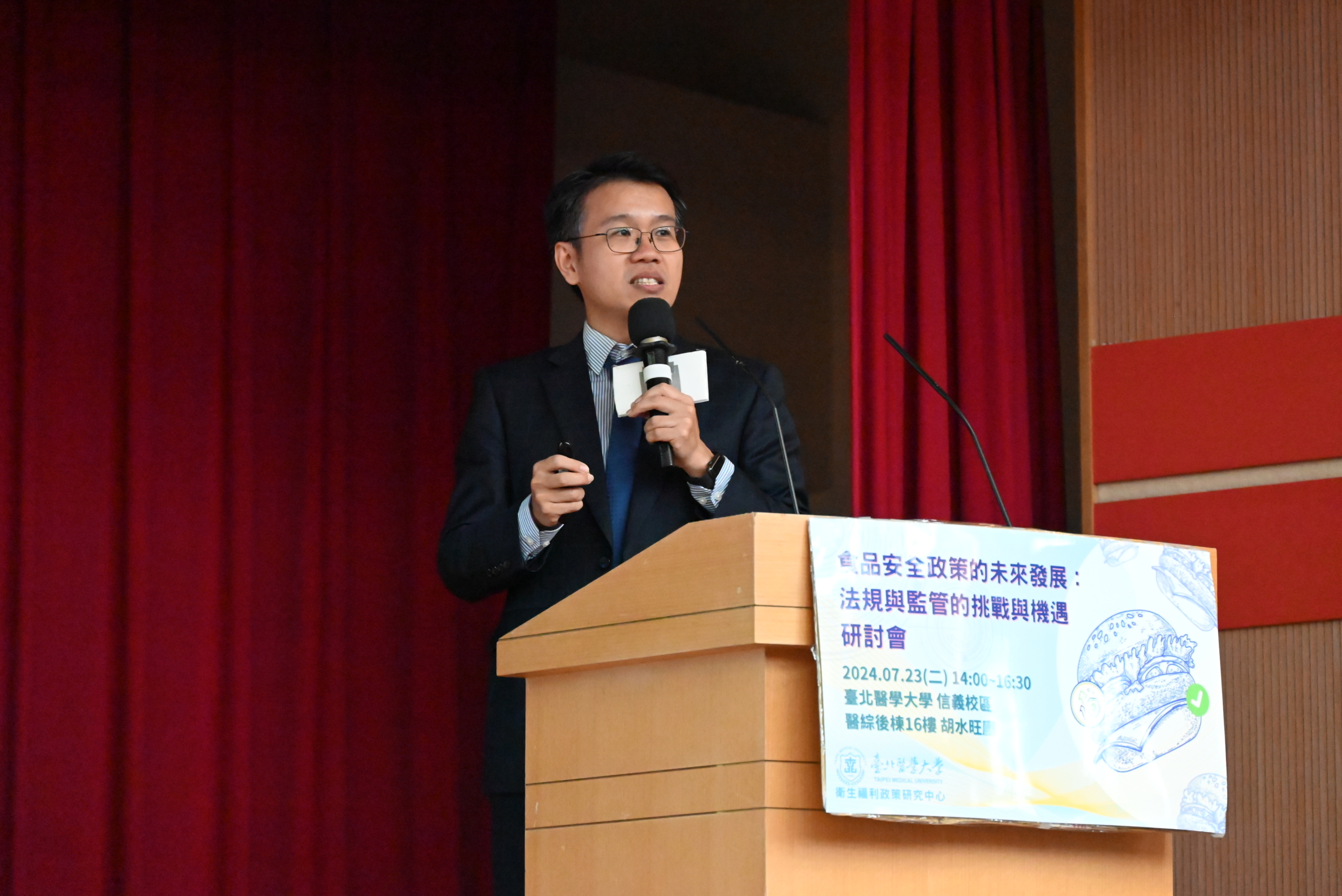
Associate Professor Liao Kaiwei of the Department of Food Safety at Taipei Medical University cited World Health Organization (WHO) data, stating that approximately one in ten people worldwide fall ill due to food contamination each year, with 40% of foodborne illnesses occurring in children under five. He noted that more than 200 diseases are caused by consuming contaminated food. Professor Liao further elaborated on the main causes of foodborne illnesses, including:
- Microbial Contamination: Bacteria, viruses, and parasites are the most common pathogens.
- Chemical Contamination: Including pesticide residues, heavy metal contamination, and overuse of food additives.
- Natural Toxins: Such as toxins naturally present in certain plants or seafood.
- Emerging Risks: Such as prions and persistent organic pollutants.
- Harmful Substances Produced During Food Processing: Such as acrylamide formed during processing.
Professor Liao emphasized that general consumers are most concerned about food safety issues and news. Since the 2011 plasticizer incident, public concern about food safety has gradually increased. Plasticizers, besides food, are also added to cosmetics, perfumes, and other products, putting Taiwanese people at a higher risk of exposure to these chemicals than in other countries.
He suggested that Taiwan should follow the research approach of the German Food Research Institute in food testing and procurement. The National Health and Nutrition Examination Survey (NHANES) in the United States regularly collects urine and blood samples from the public and periodically publishes reports to establish exposure standards, allowing for immediate tracing of contamination sources to ensure food safety.
Regarding student education, Professor Liao proposed plans to train professionals, enabling businesses to be supervised and awarded certifications to ensure food safety. Risk communication is often revealed by the media, and Professor Liao hoped the media could convey correct knowledge to the general public, improving overall food safety awareness.
Additionally, Professor Liao mentioned the “Taipei Medical University Food Safety Guardian Team” program. Since its establishment in September 2017, the program has been dedicated to creating a safe food environment on and around the campus through industry-academia cooperation. It has trained hundreds of students and provided professional guidance to hundreds of catering businesses. The latest SAFE (Stay Away From EDCs) project focuses on endocrine-disrupting chemicals (EDCs), including guidance and certification for businesses, advocacy for campus and surrounding stores, student training, and public education, among other collaborative measures.
Through these measures, Professor Liao hopes to establish a comprehensive and effective food safety protection network to safeguard the dietary health of the Taiwanese people and address the challenges of food safety in the era of globalization.
Professor Shi Chunguang Analyzes the Importance of Public Supervision in Food Safety: Everyone Is Responsible for Food Safety
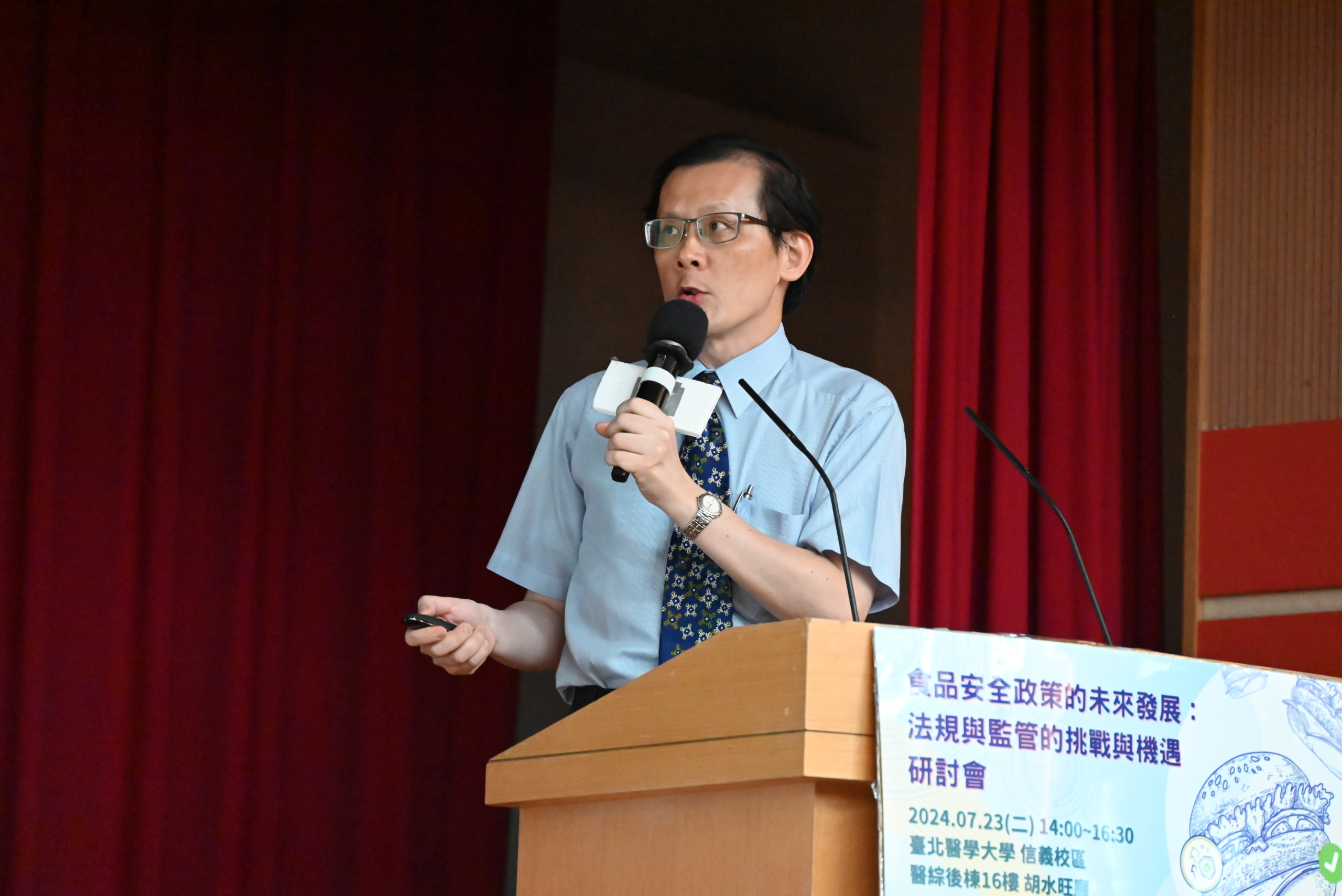
Professor Shi Chunguang of the Department of Health and Nutrition at Taipei Medical University analyzed data from the Food and Drug Administration of the Ministry of Health and Welfare, indicating that bacterial food poisoning cases are the most frequent among identified causes of food poisoning in Taiwan, with the catering industry being the most commonly involved food category. This phenomenon highlights the urgent need to strengthen food hygiene management and enhance the professional quality of catering staff. Regarding the current “Five Rings of Food Safety” policy, Professor Shi pointed out several key issues:
- Emphasis on Chemical Hazard Source Control: There are still deficiencies in the definition and management of chemical substances with food safety concerns, with an overemphasis on chemical hazards while neglecting biological (bacteria, viruses, parasites, prion protein pathogens, biotoxins like bungarotoxin) and physical (radiation contamination) hazard source control.
- Production Management: The management measures of food businesses are not comprehensive, and the management requirements are inconsistent across different industries. Additionally, the insufficient allocation of professional personnel is a major issue.
- Strengthening Inspection: The coverage and continuity of inspection themes need to be strengthened, facing challenges of manpower shortages.
- Increasing the Responsibility for Violations: The current penalties for illegal businesses are insufficient as a deterrent.
- Public Supervision: General public’s lack of understanding of related reward and punishment procedures results in low willingness to report food safety issues.
To address these challenges, Professor Shi provided relevant response suggestions:
- Comprehensive Source Control: Continuous assessment and management of chemical substances with food safety concerns, strengthening the management of high-risk and emerging risk foods, and enhancing border control for imported foods.
- Strengthening the Three-level Food Quality Control: Assisting small food businesses in implementing food quality control systems, expanding the implementation targets of the second-level quality control, and encouraging food businesses to hire more professionals such as food technicians, nutritionists, and public health specialists.
- Strengthening Inspection through Interdepartmental and Interregional Cooperation: Suggest strengthening vertical (central and local) and horizontal (interdepartmental, interregional) cooperation, and hiring and treating professional personnel well.
- Appropriately Increasing Penalties in Food Safety Regulations: Referring to domestic and international cases, amend relevant regulations to increase administrative fines, penalties, and sentences.
- Increasing Public Willingness to Supervise Food Safety: Strengthening the promotion of the importance of public supervision, reporting channels, and reward measures, while also enhancing the protection of whistleblowers.
Professor Shi particularly emphasized that food safety should be regarded as a core issue of sustainable development and public health. He suggested incorporating food safety policies into the work scope of the National Council for Sustainable Development, the National Security Council, and the Health Promotion Administration to ensure that this critical issue receives comprehensive and sustained attention.
Director/Vice Chief Inspector Mai Fude Advocates for Multi-stakeholder Collaboration to Build a Safe and Reliable Food Supply Chain

Board Director and Deputy Chief Inspector Mai Fude of the Consumers’ Foundation, R.O.C., elaborated on the diverse and complex nature of current food safety issues, emphasizing that building a safe and reliable food supply system requires collaborative efforts from government departments, industry, academia, and civil society.
Director Mai pointed out that food safety risks involve multidimensional contamination factors, including biological, chemical, and radioactive elements. He cited a series of food safety incidents in Taiwan in recent years as case studies, including the recent poisoning incident at Baolin Teahouse (biological contamination), excessive pesticide residues in food raw materials, excessive heavy metals in farmland (chemical contamination), plasticizers (radioactive contamination), and illegal use of poisonous starch and gutter oil, highlighting the necessity of full-process supervision in food manufacturing. To improve the current situation, Director Mai proposed several strategic frameworks:
- Strengthening Source Control: Including prevention of farmland pollution and pollution management of farming environments.
- Simplifying Certification Labeling Systems: Simplifying the complex current certification labeling systems to enhance consumer understanding of the system and operating regulations.
- Impartial and Strict Penalty System: Regardless of business size, products with issues must be penalized. Simultaneously, for the problem of fewer resources available to small and medium-sized food businesses, the government or private institutions can provide corresponding assistance to help improve management standards.
- Utilizing Information Technology: Enhancing the efficiency and reliability of food traceability systems (information transparency and anti-counterfeiting).
- Establishing a Tripartite Supervision Platform: Joint participation of the government, businesses, and the public in supervision.
He further called for food safety as an issue related to public health and social security, hoping that all parties can work on clear division of labor and cooperation based on scientific evidence, the precautionary principle, and information transparency. Only through a multi-stakeholder collaboration mechanism can a safe and reliable dietary environment be built for consumers, while at the same time enhancing the credibility of the overall food supply chain and realizing a stable food safety management system.
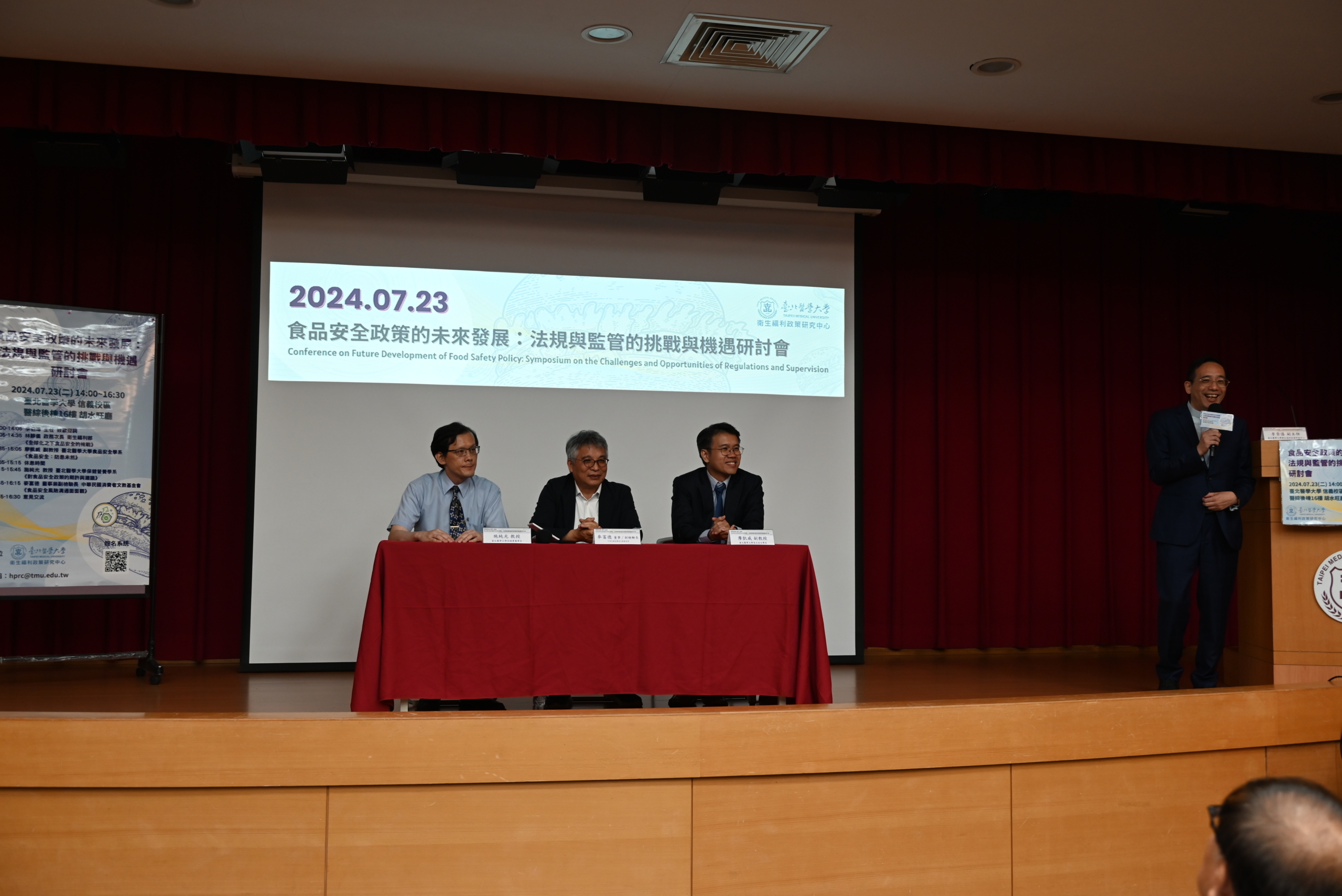
Related Media Reports: Seminar on “The Future Development of Food Safety Policy: Challenges and Opportunities in Regulation and Supervision”
On July 23, 2024, the Center for Health and Welfare Policy at Taipei Medical University held a seminar on “The Future Development of Food Safety Policy: Challenges and Opportunities in Regulation and Supervision,” delving into the food safety policy framework to address emerging food safety issues.
2024/07/23 [Central News Agency] Food Safety Issues Keep Emerging; Scholars Urge Inclusion in Presidential National Committee
https://www.cna.com.tw/news/ahel/202407230324.aspx
2024/07/23 [Central News Agency] TMU’s Food Safety Policy Seminar: Lee Bo-chang Invites Experts to Discuss New Directions in Food Safety Policy
https://howlife.cna.com.tw/local/20240723S008.aspx
2024/07/23 [China Times] Frequent Food Safety Incidents; Scholars Call for Government Action and Inclusion in Three Major Committees
https://www.chinatimes.com/realtimenews/20240723005650-260405?chdtv
2024/07/23 [Liberty Times] Frequent Food Safety Incidents; Scholars Urge Inclusion in Three Main Axes of Presidential Committees
https://news.ltn.com.tw/news/life/breakingnews/4745906
2024/07/23 [ETtoday Health Cloud] Lai Government’s Three Major Committees “Do Not Mention Food Safety Policy”; Scholars Urge Inclusion as It Has Become a Sustainability Issue
https://health.ettoday.net/news/2783125
2024/07/23 [UDN United Daily News] Food Safety Crisis Hits; WHO Statistics: Around 10% of Global Population Falls Ill Due to Food Contamination
https://udn.com/news/story/7314/8114191
2024/07/23 [Taiwan Gazette] Food Safety Challenges Intensify; Scholars Recommend Human Biomonitoring
https://anntw.com/articles/20240723-jYig
2024/07/24 [Economic Daily News] TMU’s Food Safety Policy Seminar: Experts Invited to Contribute Ideas
https://money.udn.com/money/story/7843/8116001
2024/07/25 [The Storm Media] The “Pauline Incident” Highlights Multiple Challenges in Food Safety Policy
https://www.cmmedia.com.tw/home/articles/48270
2024/07/26 [Win News] TMU’s Food Safety Policy Seminar: Lee Bo-chang Invites Experts to Discuss New Directions in Food Safety Policy
https://www.winnews.com.tw/192566/

